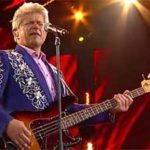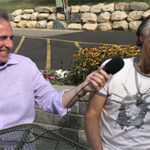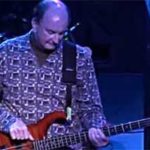Original Blood, Sweat & Tears bassist on the band’s just-released documentary
By Gary Graff
July 3, 2023
If Jim Fielder was ONLY the founding bassist of Blood, Sweat & Tears, his legacy in musical greatness would be rock solid. But the truth is there’s so much more. The Texas-born Fielder, whose family moved to southern California when he was young, attended Loara High School in Anaheim with Tim Buckley and Larry Beckett, forging a triumvirate that would be a stepping stone in all three of their careers. Fielder played on Buckley’s self-titled 1966 debut album before going on to play and record with the Mothers of Invention and Buffalo Springfield. A trip to New York during 1967 with the Mothers gave Fielder a favorable look at the city, so he was open to moving east when Al Kooper recruited him to be part of the inaugural lineup of Blood, Sweat & Tears. He stayed with the band through its first six albums — including the groundbreaking Child is Father to the Man in 1968 and the Grammy Award-winning Blood, Sweat & Tears 10 months later and forging a marriage of rock rhythm section and brassy jazz that sounds as fresh and inventive now as it was 55 years ago. Fielder parted ways with BS&T in 1974 and went on to spend more than four decades with Neil Sedaka. He’s now semi-retired and lives in Asheville, N.C.’s musically vibrant community, though he participated in What the Hell Happened to Blood, Sweat & Tears…, a new documentary about the band’s controversial U.S. Department of State-sponsored tour of Eastern Europe during the spring of 1970.
FBPO: How did you wind up playing bass?
Fielder: We have to go back to when I was in high school. I was playing guitar since I was, gosh, 8 years old. So I get into high school and this is southern California, where surf music is a big deal. So I bought myself a Fender Jaguar guitar and got together with a few friends and we did surf music, played at all the sock hops at the high school and stuff, and I was saying, “Hey, I kinda like this band business. This is a lot of fun!” And we went to see some of the local players; Dick Dale & the Del-Tones was a big one for us. The more I went to hear him and other guys the more I was paying attention to the bass. So I went out and got myself an upright bass and kinda of taught myself as much as I could.
FBPO: Just like that, huh?
Fielder: (laughs) Yeah, just like that. Then right after we graduated from high school I went to a summer jazz clinic up in Reno and met Ralph Peña, who was Frank Sinatra’s bass player. He was teaching bass up there and I told him it was something I wanted to take up. He said, “Well shoot, man, I’ll teach ya. I just live down in the San Fernando Valley,” which was just a short drive from where I lived in Anaheim. And he taught me the right way to play upright bass. And a lot of the technique that I learned from him I transferred to bass guitar and went out and bought myself a Rickenbacker bass. That was a cool instrument. They’ve got a very unique sound.
FBPO: Ironically Rickenbacker was, and still is, more associated with rock than with jazz.
Fielder: It is a stretch, isn’t it? I really wanted to play jazz. I’d bought Miles Davis’ Kind of Blue album and learned all those tunes and just started looking for opportunities to play jazz. That is what ultimately led me to Hollywood.
FBPO: So THAT’S what ruined everything!
Fielder: (laughs) I was teaching guitar at a little music studio there in Anaheim and met Jimmy Carl Black, the drummer. We became pretty good friends and he said, “Y’know, I’m in this band now called the Mothers and we’re playing at this club up in Hollywood on the Sunset Strip. You ought to come up. Let me introduce you and Timmy (Buckley) to our manager.” So we went up there and Herb Cohen was the manager and we had a reel-to-reel tape demo of the tunes that Timmy had been writing, and his eyes lit up ’cause he and his brother had a music publishing company, and back in those days if somebody had original stuff it was a big deal. Within two or three months we were in the recording studio making Tim’s first album. That was the way I kicked the door open to the music business for myself.
FBPO: That also led to you joining the Mothers. What was that like?
Fielder: That was pretty cool. Frank (Zappa) was a wonderful guy to work for, very knowledgeable about music, contemporary classical stuff and jazz, just everything. He touched all the bases. He was looking for a rhythm guitar player, so I played rhythm guitar on an electric 12-string. We recorded their second album, Absolutely Free, and I did quite a lot of touring with them. We did, like, a six-week residency at a place called the Balloon Farm in New York, which was run by Andy Warhol’s people. That was my first taste of New York, and I liked it. There was lots of good musical activity going on there.
FBPO: Your next stop was Buffalo Springfield.
Fielder: (The Mothers) got back to L.A. and I got a call from Stephen Stills who said, “Jimmy, we need your help. Our bass player (Bruce Palmer) is being deported to Canada and we need a bass player yesterday.” This was during the period of time when “For What It’s Worth” was a hit record and getting tons of airplay all over the country. I missed playing bass with Frank so I took the offer, and Frank was kind of hurt by that. But I really wanted to play bass and the Mothers had a guy named Roy Estrada playing bass, who’s just a monster. So I joined Buffalo Springfield and did a little recording but mostly road stuff. Then after a few months I get a call from Stephen and he says, “Listen, Jimmy, Bruce has snuck back into the country and we’re gonna give him his gig back, so thanks for the memories and good luck.” (laughs)
FBPO: You weren’t out of work for long, though.
Fielder: One day I was having my morning coffee on my veranda up in Laurel Canyon, in a house I can no longer afford, and I looked next door where Jim Valley lived, the lead guitarist in Paul Revere & the Raiders — we called him Harpo — and he’s having his coffee with another guy and I look and, “My God, that’s Al Kooper!” We’d crossed paths several times at the Fillmore and other places like that, so he knew me and knew who I was. Then Al’s like, “Jimmy, man, just the one man I want to see. Come over here. I got an idea I want to run by you.” In about 15 minutes he told me the whole layout that was gonna be Blood, Sweat & Tears. “Man, come out to New York and we’ll do this thing.” It was perfect timing. I sold my ’57 Chevy and bought a plane ticket, and the rest is history.
FBPO: You had a wide variety of musical experiences in a very short amount of time. What was the net effect on you as a player?
Fielder: Well, it taught me how to think on my feet. I found that by learning to identify intervals in a song I could translate those intervals into fingerings on the bass. So from a pretty early time I was able to sit down with someone who was playing something I’d never heard before and be able to play along with just about anybody. I got a reputation as someone who could learn stuff quickly.
FBPO: I imagine that approach benefitted you in Blood, Sweat & Tears.
Fielder: Right, absolutely. (The band) appealed to my sort of jazz background, and once the horns came in… We started out as just the rhythm section…and then the horns came in and from the time we had our very first rehearsals all together, I still remember the charge I felt. By this time these were all tunes I was familiar with; I knew what the changes were gonna be and everything, but, man, when those horns kicked in, whoo, holy mackerel was I in the right place!
FBPO: What did playing bass in Blood, Sweat & Tears require of you?
Fielder: It required my best. I came up with my own parts, so I had to be able to learn quickly and figure out some bass lines that would catch the attention of the listener but not cancel out everything else that the other guys were doing, particularly the horns. So I learned a lot of my bass parts in with the horns pretty quickly. That was the name of the gig. Definitely by the time we made that second album (Blood, Sweat & Tears) I knew what my part was. I knew exactly how to approach these things.
FBPO: The What the Hell Happened to Blood, Sweat & Tears… film is pretty enlightening, a story many people didn’t know before. How did you feel about it coming out?
Fielder: Well, I’m glad it’s being told. Our experience on that tour was something that bears sharing with people, and for all this time I just figured we would never see it, that those films were just lost forever. So when they found those films and put it together I said, “Wow, finally, at last I’ve lived long enough to see it happen. I was singing and tapping along the whole time I was watching the film. It was great to see that stuff, to see those guys in their prime.
FBPO: What are your memories of playing there?
Fielder: Just some really memorable occasions. A lot of the young people there were just great to us, really blown away by the concerts. We’d run into people on the street who were just, “Oh, you guys are great!” And it was a real maturing experience to see that part of the world from that point of view.
FBPO: The band took a lot of heat from both sides for the tour. The counter-culture thought you’d sold out to the government, the “establishment” thought you shouldn’t have gone. What was the aftermath like from your perspective?
Fielder: I guess in a way (guitarist) Steve Katz had that right; he didn’t think we should to the tour, but we had to partly to keep David (Clayton-Thomas) in the country and singing for us. But more than anything that eastern European tour was kind of a focal point for the band. It really showed us that the music we were doing was the right thing to be doing. We had kind of glimpse of that at Woodstock when we played there, but the tour showed us even more.
FBPO: How come you left when you did?
Fielder: Some guys in the horn section weren’t real happy with my playing. These were all pretty heavy jazz players — gosh, we had Lew Soloff (trumpet) and Dave Bargeron (trombone) was kind of the focal point for my leaving. I couldn’t blame him; I’d done my bit for the band and they wanted to push on to more advanced stuff, so that was it. I moved back to L.A. where a friend of mine was the sound man for Neil Sedaka and one day he called me and said, “Jimmy, Neil needs a bass player yesterday!” (laughs) So I’m jumping in again, to all new music for me. I had one rehearsal then hit the road, and he was working a lot.
FBPO: You spent a long time with Sedaka. You must have liked it.
Fielder: Oh yeah, I enjoyed the heck out of it. He liked my playing, and we did a lot of stuff, particularly the casino stuff, with full orchestra — a full string section, harp, a full big band horn section. That was really cool. We did a lot of Vegas, Reno, Tahoe, Atlantic City and some big, fairly important concert work at Carnegie Hall, the Hollywood Bowl, places like that. It turned out to be a really good gig, yeah.
See Jon’s blog, with key takeaways from this interview here.





Great interview
Thanks, John! I hope you got something out of it.
Thank you Mr. Graff for this updated article on Jim Fielder. It was sensitive and insightful. I also want to thank Mr. Fielder for his openness and honesty.
I first saw Jim Fielder and Blood, Sweat & Tears in the fall of 1969 when I was a freshman music major at the University of Southern Mississippi. I played upright bass in the school symphony, and had just used the upright to earn a place in the school Jazz Lab Band. I was just beginning to tinker with the electric, ( bass guitar ), which was going to be useful in the jazz band, but I was having trouble making the transition.
As I watched Jim Fielder play, I was totally captivated. His playing was fluid and smooth, and his plucking technique was fabulous. Even the way he held the bass exuded confidence. It was obvious he was in total control.
Suddenly it hit me — `I want to play like that guy !!! `. And I proceeded to do so for all my active playing life, appx 25 years.
What an inspiration! Adopting Jim Fielder`s `style` revolutionized my concept of the bass guitar and enhanced my bass playing overall.It took my bass playing literally to the next level and beyond.
I owe Jim Fielder a great debt, but I`m not the only one. It is my sense that there were many aspiring bassists from my era ( 53 years ago ) who watched Mr Fielder and learned from him. He was a real pioneer and he showed us how it was supposed to be done. On behalf of myself and all of Mr. Fielder`s other `students`, I wish to thank him, from my heart — Mr. Fielder, thank you so very, very much.
Great tribute, John. Thanks very much for weighing in!
Jim has always been a huge influence on my musical journey. His playing on BS&T opened a lot of doors for me!
Jim’s awesome for sure. Thanks, Montgomery.
Wonderful interview, thank you. I absolutely loved BS&T, and especially Jim’s playing. I was just starting out myself, and adored the sound he generated amongst all that brass, help sell me into buying my first Fender Bass too.
I also appreciate being brought up to date, as I often wondered what happened to the man. I am so pleased that he just kept on playing.
Again thank you [to both]
Glad you enjoyed the interview, Sydney. Thanks for weighing in.